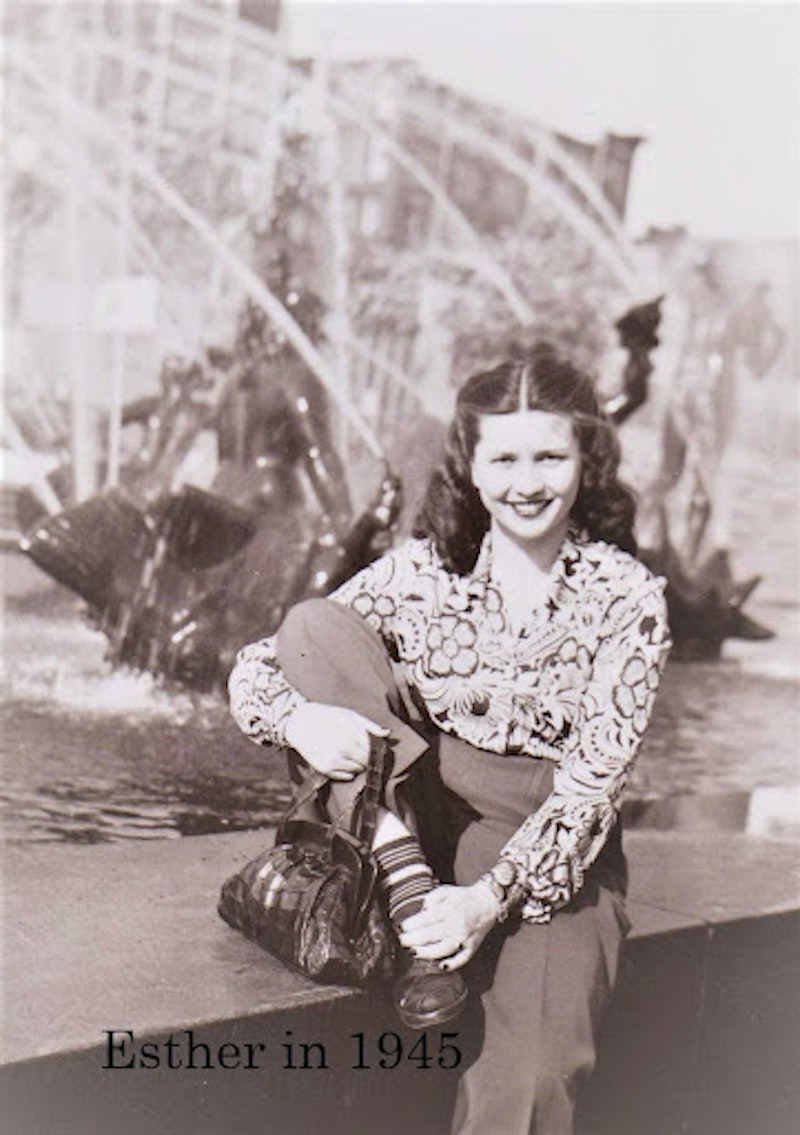My mother, Esther, was 19 and working in Manhattan when World War II broke out. She’d left Oklahoma a few years before because her high school wouldn’t allow her to wear slacks. If you knew Esther, it’s doubtful you ever saw her in anything but slacks. In NYC, she worked as a flower girl selling gardenias in the nightclubs.
As a couple passed by she’d say, sotto voce, to the man, “Goddamn your lady.” The man would stop and turn, “What!” Esther would then say, all smiles and louder, “Gardenia for your lady?” The man, now stopped, couldn’t continue without a flower for his date. She sold a lot of gardenias that way. Her sister Mary Lou was a cigarette girl (specifically a Chesterfield girl) and her brother Bill tended and managed the bar. They worked at the 21 Club, the Stork Club, and others. Esther loved the sailors and they loved her foul mouth. When she was a child, Esther’s father had given her nickels as positive reinforcement for whenever she cussed.
After the war, she moved to Baltimore, bought a bar with her siblings, married a sailor and had four kids. I recall her shouting down the stairs like a sea-captain, “ALL HANDS ON DECK!” No klaxon horn, of course (but the mind fills in the gaps). This was usually because some very important mail or slip of paper had been left on the newel post from which she was shouting and then disappeared, blown by some draft with ill intentions into the chaos that was down those stairs. What followed was a stem-to-stern search of the house for the document/envelope.
But there was an even greater call for urgency in our household and it happened far more frequently. We’d be doing kid things and then hear repeated several times at full volume: “COMBS AND BRUSHES!!” This meant Esther had awakened and decided it was a good day to wash her hair. She claimed Native-American ancestry. Many people called her the Chief and her hair was proof enough in the days before DNA testing. She had long black hair and washed it once a week or so, less in the winter. But this ritual had to be followed.
First, the “COMBS AND BRUSHES!” I had two sisters and they’d drop a comb or brush anywhere they might’ve finished with it. Our job, brothers and sisters, was to drop everything and search the house for these wayward implements and get them to the second floor bathroom immediately. Fighter pilots don’t scramble as fast as we did. The hair simply couldn’t be washed without every comb and brush available. The red comb, the round brush, that good one from Fuller Brush. All had identities and a role to play in the hair-washing. If a particular comb was needed and wasn’t found, beatings would follow.
Woe unto the child caught watching television during a COMBS AND BRUSHES event. I’ll admit to “searching” without actually “looking” on a few of these patrols.
All the assembled combs and brushes had to go into the sink for cleaning. And the sink had to be cleaned first. Honestly, there’s no telling where or in what they might have been found. We were kids, true house apes, and we tore everything up in the normal course of a day. A brush in the mud was minor. After the combs and brushes were scrubbed/sanitized, the sink needed cleaning again before the hair-washing could begin. Many clean towels were gathered nearby.
The hair-washing took place behind a closed door. Who knows what dark magic was involved? Drying Esther’s hair was the most time-consuming part of the process. She’d sit in a kitchen chair with towels over her shoulders and my sisters would comb out the water and blot the wet ends. Towels were replaced and more water would be combed out. Hours of this and Esther would find her hair still damp. I wondered about the Native-Americans. How did they manage to keep their hair dry during the rainy season?
I gather that at some point in history women routinely died of “wet hair.” Esther wouldn’t leave the house with damp hair. “Honey, goddamn, I can’t go yet… my hair’s still wet.” Guys don’t have this data point. We regularly hazard normal activities like going outdoors with wet hair. As a child, my dad insisted I sport a buzz cut so I never used a comb or brush until late in high school. My hair was never long enough to need one. When my sisters would get their hair washed, during the comb-out there was talk (mostly cussing) of rats’ nests. Not tangles, honey; this was the heart of Baltimore. Rats’ nests. Lots of crying as Esther tried to eradicate their rats’ nests. Yanking through the knots, giving them “something to cry about” when they cried. Remember “No More Tears” shampoo? We didn’t have that.

